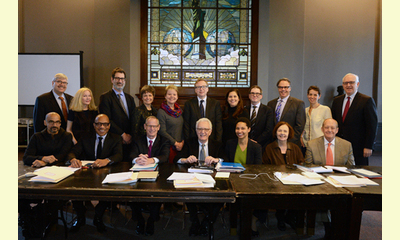|
|
Another Pulitzer for reporting classified info
un article par Cora Currier for Columbia Journalism Review
The Pulitzer committee’s decision to give its public service award this year to the Washington Post and the Guardian for their stories on government surveillance has elicited a few predictable reactions from those who believe that the source of the National Security Agency material—former intelligence contractor Edward Snowden—is not a whistleblower, but a criminal.

The Pulitzer Prize Board 2013–2014
click on photo to enlarge
US Rep. Peter King of New York told the Associated Press that the award was “rewarding illegal conduct” and tweeted, “awarding the Pulitzer to Snowden enablers is a disgrace.” Former Bush administration lawyer John Yoo told Politico that the prize shouldn’t be “a vindication for Snowden’s crimes.”
Last month, Politico wrote that giving the award to the NSA reports “would inevitably be perceived as a political act, with the Pulitzer committee invoking its prestige on behalf of one side in a bitter national argument.” Politico, like other outlets, compared the situation to the New York Times’ 1972 win for its stories on the Pentagon Papers, another whistleblower case with a large-scale leak of secret documents.
But that comparison overshadows a number of honors in the intervening time that have gone to coverage based on classified material, notably that of CIA black sites and warrantless wiretapping. Those disclosures were also controversial and fundamentally changed our understanding of US counterterrorism efforts.
In 2006, the Washington Post’s Dana Priest won a Pulitzer for reporting on the CIA’s detention and interrogation of terror suspects. At the time, “the executive branch, members of congress and many conservative TV pundits were searingly critical of my reporting and of The Post for publishing it,” said Priest in an email to CJR. “The email and message machine reaction was overwhelmingly negative.”
Eight years after Priest’s stories, senators are engaged in a pitched public battle with the CIA over the declassification of a Senate intelligence committee report on the agency’s activities during those years.
“It is stunning to me that now Congress [is] pushing the CIA to declassify information they used to say would damage national security if released,” said Priest. Top former intelligence officials have even weighed in in favor of declassification. (Ironically, US Sen. Dianne Feinstein, who heads the intelligence committee and is leading the charge to release the report, has asked the Justice Department to investigate who leaked the report’s key findings to McClatchy last week. “If someone distributed any part of this classified report, they broke the law and should be prosecuted,” Feinstein said.)
James Risen and Eric Lichtblau were also honored in 2006 for their revelation of the Bush administration’s warrantless wiretapping program. The reporters likewise faced critics who called their exposé treasonous (while others condemned them for holding the story for a year after administration officials urged them not to publish). Former Vice President Dick Cheney said in 2009 that “it always aggravated me” that the Times won that Pulitzer.
(This article is continued in the discussionboard)
|








|
DISCUSSION
Question(s) liée(s) à cet article:
The courage of Mordecai Vanunu and other whistle-blowers, , How can we emulate it in our lives?
* * * * *
Commentaire le plus récent:
Whistle-blowers may be considered as very important actors for a culture of peace. As described on the CPNN page for values, attitudes and actions for a culture of peace, the culture of war is characterized by propaganda, secrecy, government control of media, militaristic language and censorship while the culture of peace is characterized by the free flow and sharing of information. Whistle-blowers break the back of secrecy directly and dramatically.
Mordecai Vanunu's courage continues the tradition of Daniel Ellsberg, who made known the Pentagon Papers during the Vietnam War and Karen Silkwood, who exposed nuclear pollution in the United States. Ellsberg was persecuted by President Nixon and Karen Silkwood was murdered, as described some years ago in a very fine film starring Meryl Streep.
As the amount of government secrecy continues to increase, we may expect that the number of whistle-blowers will also tend to increase in the years to come.

|
|









